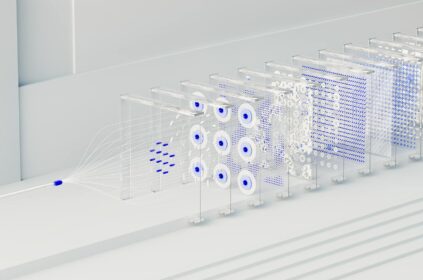Artificial intelligence (AI) is poised to become one of the most transformative technologies of our generation. From self-driving vehicles to personalized medical treatments, AI’s capabilities are reaching ever further. Yet, with its rise come both excitement and questions about its societal impact. Whether you view it with the cautious optimism of a scientist or the curiosity of a layperson, understanding AI’s potential and complexities is becoming increasingly crucial in today’s technology-driven world.
What is AI?
At its core, AI refers to the development of computer systems that exhibit behaviours we typically associate with human intelligence. These include mimicking abilities like learning, reasoning, problem-solving, and even creativity. AI is far more than just automation; it operates on complex algorithms and datasets that often enable it to go beyond simply following programmed instructions.
Types of AI
The realm of AI is vast and multifaceted. Here’s a simplified breakdown of some key types:
- Narrow or Weak AI: Designed to excel at a specific task like classifying images or recommending products. Most AI we encounter today falls into this category.
- Artificial General Intelligence (AGI): Hypothetical AI with human-level cognitive abilities across a wider range of tasks and problems.
- Artificial Superintelligence (ASI): A concept, if it ever actualizes, where AI surpasses human intelligence entirely. Currently in the realm of science fiction and speculation.
- Machine Learning (ML): A core field within AI, focuses on systems that learn without explicit programming. ML algorithms “absorb” vast amounts of data, identify patterns, and then apply that knowledge to new situations.
- Deep Learning: A specific subset of ML using neural networks inspired by the human brain, known for its power in recognizing images, speech, and text.
The Rise of AI Over the Years
AI’s roots go back further than you might think, but recent advancements have spurred explosive growth:
- 1950s: Alan Turing’s pioneering “Turing Test” proposed measuring machine intelligence against human benchmarks.
- 1980s-90s: “Expert systems” attempted to codify specialized knowledge but had limitations.
- 2000s: Increased computing power & massive datasets enabled breakthroughs in ML techniques.
- 2010s: Deep learning, fuelled by large tech companies, unlocked progress in facial recognition, self-driving cars, etc.
- Today: AI permeates countless aspects of our lives, from social media to online banking. [Reference an up-to-date statistic on AI adoption here]
AI Use Cases Across Industries
AI’s transformative power stretches across fields, streamlining workflows and sometimes sparking paradigm shifts:
Marketing
- Personalized Recommendations: Algorithms analyse customer data to suggest products tailored to individual needs.
- Chatbots: AI-powered conversational agents improve customer support and engage leads 24/7.
- Sentiment Analysis: Understanding customer emotions across online reviews or social media aids brand reputation management.
- Ad Targeting: Precise AI-driven audience targeting helps maximize the efficiency of marketing campaigns.
Design
- Generative AI: Tools like DALL-E and Midjourney can create high-quality images from text prompts, streamlining concepts and aiding the creative process.
- Prototyping Tools: AI-powered design assistants suggest layout or colour improvements, aiding quick iteration.
- Personalization: AI analyses user behaviour to deliver website or app layouts that best suit the individual.
Data Science
- Data Cleaning & Preparation: AI systems help sift through large datasets, ensuring quality and reliability for downstream analysis.
- Predictive Analytics: Machine learning models identify patterns to predict future outcomes, driving insights in healthcare, finance, and more.
- Identifying Anomalies: AI can detect patterns that deviate from the ordinary, aiding in the discovery of issues like fraud or system failures.
Accounting
- Automation of Routine Tasks: Rule-based AI takes on bookkeeping, categorization, and invoice processing, freeing accountants to focus on more strategic activities.
- Fraud Detection: AI excels at identifying fraudulent trends early, mitigating financial risks.
- Financial Advice: “Robo-advisors” are increasingly used to automate personalized investment recommendations for everyday users.
Common and Accessible AI Tools
You don’t need to be a data scientist to harness the power of AI. These cutting-edge tools are widely accessible:
- Microsoft Copilot: An AI-powered chatbot (but so much more). It auto-generates code snippets and provides real-time code suggestions. It can also generate images and text and its functionality can be extended by using extensions.
- Google Gemini: Large Language Model (LLM) within Google’s AI ecosystem, known for its vast knowledge base and conversation-like query answers. It is also able to generate images, help you plan travel and more.
- OpenAI’s ChatGPT: A powerful LLM model adept at generating diverse text formats, translating languages, and even writing different genres of creative content.
- Midjourney: Generates breathtaking artwork and visualizations based on user-provided text and image supported prompts.
AI Power for Your Business: Discover the Best Tools by Use Case
Will AI Take Jobs? The Arguments
One of the most pressing concerns surrounding AI is its potential impact on the job market. The debate is nuanced:
- Job Displacement: AI is adept at automating routine tasks, which could lead to short-term job losses, particularly in repetitive or rule-based professions.
- Job Creation: New jobs in industries like AI development, maintenance, and ethical oversight are inevitable.
- Job Transformation: Many careers will shift as humans focus on high-value tasks that machines cannot easily replicate, requiring adaptability and continuous learning.
How AI is Here to Help and Improve Our Lives
While ethical concerns should always be part of the discussion, focusing on AI’s positive potential is equally important. Let’s dive into additional ways AI revolutionizes how we live and work:
- Accelerated Content Creation: AI tools now help generate everything from marketing copy to social media posts to even basic news articles. These tools free up time, boosting productivity for content creators.
- Streamlined Workflows: AI tackles tedious tasks across industries. Take the legal profession, where AI systems analyse lengthy contracts and documents, significantly decreasing manual analysis time. From automating email responses to scheduling meetings, AI simplifies processes, increasing efficiency.
- Significant Cost and Time Savings: By automating manual work and identifying optimization opportunities, AI cuts labour costs and allows employees to focus on higher-value tasks. AI-powered chatbots, for example, reduce demand for customer service representatives, resulting in savings for businesses.
- Driving Innovation: AI-powered analytics identify patterns in data that humans might miss, unlocking possibilities for innovation in virtually every industry. Researchers utilize AI to find new drug compounds, manufacturers improve product designs, and marketers discover new insights about consumer behaviour.
- Healthcare Breakthroughs: AI analyses medical images, aiding early disease detection and drug development.
- Personalized Education: AI tutors dynamically adjust lessons to each student’s needs, optimizing learning outcomes.
- Environmental Initiatives: AI analyses data to optimize energy use, model climate patterns, and support conservation efforts.
- Accessibility Enhancements: AI helps those with disabilities with tools like text-to-speech and smart-home devices.
Important Caveat: Remember, AI should be considered as a powerful assistant, not a total replacement for human skill and judgment. Its success truly lies in intelligent collaboration between humans and machines.
The AI revolution is undeniable and irreversible. However, its full impact is still to be experienced. History shows that significant technological shifts create temporary disruptions but ultimately drive progress. It’s imperative to adapt, acquire new skills, and be part of the conversation – ensuring we shape an AI-powered future that benefits society as a whole.
Key Takeaways
- AI is complex and continuously evolving – be a lifelong learner in this area.
- AI’s impact will span industries; your adaptability and openness to new skills are key to thriving.
- Ethical considerations around AI are crucial: advocate for responsible deployment and equitable access.
- Focus on human creativity and collaboration with AI. Tools enhance but can’t replace unique human contributions.






